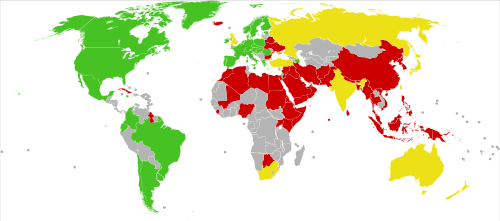Pornography in China
Pornography in China is strictly prohibited under Chinese criminal law. Those producing, disseminating, or selling sexually explicit material may be sentenced to life imprisonment. There is an ongoing campaign against "spiritual pollution", the term referencing the Chinese Communist party's Anti-Spiritual Pollution Campaign of 1983. Although pornography is illegal, it is available via the Internet.[1][2]

Chinese authorities have closed down many pornographic services in recent years, but an ongoing cat and mouse game between the two has led providers and users to find other ways to share adult content, both self-made and pirated from other pornographic film studios. In this aspect the development of the nation's online porn industry reflects the overall development of China's Internet.[3]
Phases and forms of development
Internet pornography was outlawed in China in 2002, when the authorities issued guidelines requiring that all websites remove any pornographic material.[4] The government began to suppress pornographic websites in 2004, and one woman was imprisoned.[5]
Pornographic websites: 2004–2006
The first pornographic websites appeared in China before sites like YouPorn and Pornhub became popular in the West. A few major (though ill-fated) websites appeared in China during 2004, including "99 Erotica Forum" and "Erotica Juneday". Some of these websites are still in existence, but many have disappeared. The business model for these websites requires visitors to navigate through pay-per-click advertisements for sex toys, Viagra-esque pills, and online casinos before they can watch or download pornographic content. The websites typically offer a mix of domestic amateur pornography videos and pirated content from Japan, Europe and the US. They typically set up their servers overseas and frequently change their URLs to avoid being detected by the authorities.
For some users, the quantity of advertisements on these websites can be uncomfortable and frustrating. Sometimes there is no pornographic content available after the advertisements have been navigated. The chance of picking up malware in the process is high. Hence some services in China charge a membership fee in return for greater reliability and fewer or no advertisements. However, in China the use of domestic bank accounts makes such websites vulnerable to the authorities. "99 Erotica" was among the first to be closed after having acquired more than 300,000 registered users within a year of its launch. In 2005 authorities sentenced its eleven workers, among them teachers and civil servants, to imprisonment ranging from three to twelve years for disseminating obscene material. In October 2006 authorities closed down "Erotica Juneday", which charged its highest-paying members 3,999 yuan (then around $490) a year, and sentenced founder Chen Hui to life imprisonment.[6] Among those who complained about the harshness of the sentence was the sociologist Li Yinhe. She called on authorities to either repeal the pornography laws in China or stop pretending the nation enjoys freedom of expression.
2008 onwards
Since 2008, the production of pornographic films has been banned. The State Administration of Radio, Film and Television's prohibition on pornography has been complete, and the government has shown no signs of reversing its decision. Directors, producers, and actors involved in pornographic films have been barred from competing in any film competitions. Any film studio found in violation may have its license revoked.[7] As a result of this action, adult films and media can only be obtained through the Internet or on the black market. Possession of pornography is punishable by up to 3 years in prison, a fine of CN¥ 20,000, or up to life imprisonment for large underground distributors.[8] In 2010 China shut down 60,000 pornographic websites and arrested almost 5,000 suspects.[9]
Slang terms
Pornography collectors who have resources are called "old drivers" (Chinese: 老司机; pinyin: Lǎo sījī),[10] while sharing pornographic videos is referred to as "driving" (Chinese: 开车; pinyin: Kāichē), the recipient of the content is known as a "car seat" (Chinese: 坐车; pinyin: Zuòchē) and pornography is "welfare" (Chinese: 福利; pinyin: Fúlì).[11]
See also
- Pornography laws by region
- Internet censorship in China
- Legality of child pornography
- Legal status of internet pornography
References
- Barmé, Geremie R (17 November 2013). "Spiritual Pollution Thirty Years On". Australian Centre on China in the World - Australian Centre on China in the World. Retrieved 28 July 2018.
- KIM WALL (6 June 2013). "Sex and the Law in China: 'The People Will Pull, and the Government Will Follow'". China: The Atlantic. Retrieved 2018-07-28.
- France, Agence (1 July 2015). "China passes new national security law extending control over internet". The Guardian. Retrieved 2018-07-28.
- "China creates stern Internet, e-mail rules". USA Today. 2002-01-18. Retrieved 2008-01-01.
- Richardson, Tim (2004-08-16). "China jails woman in porn crackdown". The Register. Retrieved 2008-01-01.
- "央视《焦点访谈》:捣毁"情色六月天"". CCTV.com (in Chinese). 中央电视台 - CCTV. 20 December 2006. Retrieved 2018-07-23.
- "Production of XXX movies banned in China — UPI.com". United Press International (www.upi.com). 2008-01-01. Retrieved 2008-01-01.
- "Laws of the People's Republic of China (Articles 152 and 363 to 367)". www.asianlii.org. Retrieved 28 November 2015.
- Blanchard, Ben; Mao, Sabrina; Lim, Benjamin Kang (30 December 2010). "China shuts over 60,000 porn websites this year". Reuters. Retrieved 30 November 2019.
- "老司机 (网络用语)". Baidu Baike (百度百科). Retrieved 2019-06-26.
- "网络用语词典". Spacekid (太空小孩). Retrieved 2019-06-26.